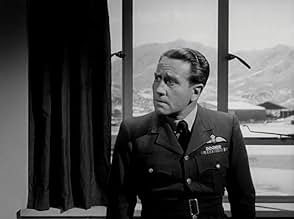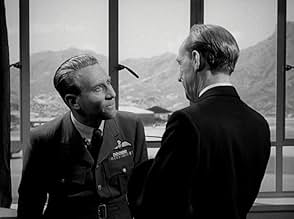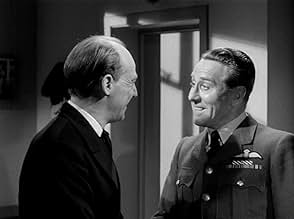IMDb रेटिंग
7.0/10
1.7 हज़ार
आपकी रेटिंग
अपनी भाषा में प्लॉट जोड़ेंOn a routine flight from Hong Kong to Japan, a British military transport aircraft's fate may or may not depend on a prophetic nightmare.On a routine flight from Hong Kong to Japan, a British military transport aircraft's fate may or may not depend on a prophetic nightmare.On a routine flight from Hong Kong to Japan, a British military transport aircraft's fate may or may not depend on a prophetic nightmare.
- 4 BAFTA अवार्ड के लिए नामांकित
- 4 कुल नामांकन
फ़ीचर्ड समीक्षाएं
On display is one of the greatest scenarios ever presented in film - a flight over the Orient of which an anonymous British officer has had a dream premonition of disaster. What is so great about this idea and how it was executed here is that the dream itself is simply a catalyst for a psychological probing of the behavior of the passengers once they learn one-by-one about the particulars of the dream and how these particulars are playing out in their real flight. The theme then becomes the old-as-Shakespeare literary idea of fate vs. free will, but the strength of the filmmakers is that it is never resolved conclusively in the end. Even when the characters do hint at not letting a particular passenger on board the plane because this passenger has been prophesized to be an integral part of the disaster, they take no serious action to remove him, instinctively realizing that even that may not give them greater control over the situation.
The contrast of a modern technological artifice such as an aircraft with an archaic-style premonition is so brilliant because it portrays the ultimate paradox of human technological evolution: the farther human beings advance in their technological feats of control, paradoxically, the greater their lives are placed in the hands of the gods (fate) with all the many ways in which that technology can go tragically awry. For a simple idea, the filmmakers were obviously thinking, and they have added multiple layers to the story. "Night My Number Came Up" is a film I hope to see many times to pick up some themes I missed the first time. Like paintings, writing, and other forms of art, I believe that it is this characteristic which distinguishes great art from all the rest.
The contrast of a modern technological artifice such as an aircraft with an archaic-style premonition is so brilliant because it portrays the ultimate paradox of human technological evolution: the farther human beings advance in their technological feats of control, paradoxically, the greater their lives are placed in the hands of the gods (fate) with all the many ways in which that technology can go tragically awry. For a simple idea, the filmmakers were obviously thinking, and they have added multiple layers to the story. "Night My Number Came Up" is a film I hope to see many times to pick up some themes I missed the first time. Like paintings, writing, and other forms of art, I believe that it is this characteristic which distinguishes great art from all the rest.
Commander Michael Hordern has a detailed dream of 8 people in a plane crash which he relays to a group of travellers....due to fly the next day.
Interesting notion around whether destiny is preordained. A fine British cast deliver quite a theatrical piece with Redgrave, Knox and Elliott on fine form throughout this will they won't they fulfill the dream
Interesting notion around whether destiny is preordained. A fine British cast deliver quite a theatrical piece with Redgrave, Knox and Elliott on fine form throughout this will they won't they fulfill the dream
This is a film which will stay with you for a long time. Its title sets the tone for what follows : a flight which, as it continues, looks more and more to be one that will end in disaster and thus, apparently, mean that a man's dream regarding it will come frighteningly true. The increasing sense of foreboding is alleviated at one time or another by a development that appears to be at odds with the dream, that is, until something else transpires which then sees the exact circumstances of the dream restored. It is a film which, not unnaturally, gives rise to tension-laden conversations about whether there is such a thing as fate, but that is not the main impact of this film, which is that one's attention is riveted from the opening scene to the final shocking end.
until
until
I saw this movie in 1955, when I was 35 and not so long after my time in the Air Force in WWII, so the RAF flight in the Dakota (same as our USAF C47 and the civilian DC3) resonated for me. But it was really the extraordinary level of suspense that made it so memorable. It starts with a dream of a Dakota lost in a storm and crashing onto a rocky beach. Crucial is the exact number on board. As the real trip progresses in stages, passengers get on and off. Just as it seems the fatal number has been circumvented, something happens to re-institute it. The way this was done was so believable and artfully handled. I particularly remember an episode with someone pointing out that telling the pilot the dream is not such a good idea; after all, he needs his skills to fly the plane safely, and if he takes the dream seriously and it makes him nervous...I have used this idea the rest of my life when directing hundreds of people. It touches on a profound bit of philosophy: when is deception justified? A great movie: if you get the chance, don't miss it.
Leslie Halliwell in his book HALLIWELL'S HARVEST refers to this as a "smoking room story", which is the kind of reminiscence tale told between old friends in a club over drinks. It is not given in one shot - all good anecdotes are told slowly and build up. This one (apparently based on a true incident from the Far East in the late 1940s) takes it's time, but as it progresses the momentum of events squeeze and squeeze the human personnel involved until the moment of crisis.
Do you believe in fate? It is an issue that has perplexed man since we first began to reason. Are our destinies written out in the stars of astrology, or in the hands of the three Greek "Fates" who spin, measure, and cut our threads? Or is everything done by chance, pure and simple? Years ago I read a portion of an essay by William James (I think it was him) for a philosophy course. James dismissed fate - he felt that the problem with believing in it is that if you decide to go down street A to reach point D a fatalist will say that you were always supposed to do that. But if you go down Street B to reach point D the fatalist would say the same thing, and that didn't sit well with James. But a fatalist would probably point out that as you went on that occasion only by one of those routes, that is the destined route you had to take at that occasion. So who can really know? In THE NIGHT MY NUMBER CAME UP, Michael Redgrave is a British Air Marshall who must go on a mission with several others, including Denholm Elliot and Alexander Knox in one of the military Dakotas used in World War II. There would be nothing wrong about this, but Michael Hordern who is in charge of arranging the trip has just had a nightmare wherein Redgrave, Elliot, Knox, and several others are traveling to the location of this mission (which Hordern did not know about when he went to bed that night) in a Dakota that is in mechanical difficulties and in very bad weather. In fact, it is crashing on a beach.
Hordern makes the mistake of telling this to the three of them, and while Redgrave pooh-poohs it, Elliot and Knox are not as certain (although Knox pretends it is all nonsense). Among other things, a major political figure (Ralph Truman) is supposed to be on the plane too in the dream, and he is not scheduled to attend the mission that Redgrave is going on. So the preparations go ahead. But point by point, little things from the dream begin to fall into place in the real world. For example, at a stopover, Truman suddenly shows up - he has to go by the Dakota on a separate trip, hooking up to another flight later on. Also there are a certain number of passengers, including a noisy one, who are to be on the plane. Everyone is happy when the number of passengers goes down, but it goes up as well. Then a rather noisy, boisterous businessman (George Rose, naturally), comes on board - literally manipulating his way on board when initially kept off by Elliot and Knox (he circumvents them going to Redgrave and Truman).
So the circumstances grow in the small world of that pressurized cabin as the passengers watch amazed at how good weather collapses and engine problems multiply (they can't raise the plane above a certain level outside the storm due to a pressurization problem - ironically enough). But Redgrave maintains his icy calm throughout the situation - he is determined that he and the others are not going to give into panic over the paranormal.
The film is excellent in tackling this type of situation in a serious way. In the end it does not matter if you are a fatalist or not, the film will carry you to to it's conclusion successfully.
One final minor point. I don't know much about the scrap metal business, but this film (made in 1955) and the Judy Holliday movie BORN YESTERDAY (1950) and one classic sequence in THE BEST YEARS OF OUR LIVES (1946) with Dana Andrews and the scrapped fleet of bombers are the only ones that seem to tackle this growing big business. A lot of military hardware was there for the taking after 1945. In BORN YESTERDAY, Harry (Broderick Crawford) owns junk yards and has built a local empire on scrap metal (and is in Washington to try to get the laws altered to expand his business). Here, George Rose (an English counterpart to Harry) is trying to get on the flight in order to get to Japan for an important conference dealing with British scrap metal interests in the Far East (and he constantly mentions the American competition as intense - a nod to Crawford?). It's almost enough to start a college study into the post war scrap metal business!
Do you believe in fate? It is an issue that has perplexed man since we first began to reason. Are our destinies written out in the stars of astrology, or in the hands of the three Greek "Fates" who spin, measure, and cut our threads? Or is everything done by chance, pure and simple? Years ago I read a portion of an essay by William James (I think it was him) for a philosophy course. James dismissed fate - he felt that the problem with believing in it is that if you decide to go down street A to reach point D a fatalist will say that you were always supposed to do that. But if you go down Street B to reach point D the fatalist would say the same thing, and that didn't sit well with James. But a fatalist would probably point out that as you went on that occasion only by one of those routes, that is the destined route you had to take at that occasion. So who can really know? In THE NIGHT MY NUMBER CAME UP, Michael Redgrave is a British Air Marshall who must go on a mission with several others, including Denholm Elliot and Alexander Knox in one of the military Dakotas used in World War II. There would be nothing wrong about this, but Michael Hordern who is in charge of arranging the trip has just had a nightmare wherein Redgrave, Elliot, Knox, and several others are traveling to the location of this mission (which Hordern did not know about when he went to bed that night) in a Dakota that is in mechanical difficulties and in very bad weather. In fact, it is crashing on a beach.
Hordern makes the mistake of telling this to the three of them, and while Redgrave pooh-poohs it, Elliot and Knox are not as certain (although Knox pretends it is all nonsense). Among other things, a major political figure (Ralph Truman) is supposed to be on the plane too in the dream, and he is not scheduled to attend the mission that Redgrave is going on. So the preparations go ahead. But point by point, little things from the dream begin to fall into place in the real world. For example, at a stopover, Truman suddenly shows up - he has to go by the Dakota on a separate trip, hooking up to another flight later on. Also there are a certain number of passengers, including a noisy one, who are to be on the plane. Everyone is happy when the number of passengers goes down, but it goes up as well. Then a rather noisy, boisterous businessman (George Rose, naturally), comes on board - literally manipulating his way on board when initially kept off by Elliot and Knox (he circumvents them going to Redgrave and Truman).
So the circumstances grow in the small world of that pressurized cabin as the passengers watch amazed at how good weather collapses and engine problems multiply (they can't raise the plane above a certain level outside the storm due to a pressurization problem - ironically enough). But Redgrave maintains his icy calm throughout the situation - he is determined that he and the others are not going to give into panic over the paranormal.
The film is excellent in tackling this type of situation in a serious way. In the end it does not matter if you are a fatalist or not, the film will carry you to to it's conclusion successfully.
One final minor point. I don't know much about the scrap metal business, but this film (made in 1955) and the Judy Holliday movie BORN YESTERDAY (1950) and one classic sequence in THE BEST YEARS OF OUR LIVES (1946) with Dana Andrews and the scrapped fleet of bombers are the only ones that seem to tackle this growing big business. A lot of military hardware was there for the taking after 1945. In BORN YESTERDAY, Harry (Broderick Crawford) owns junk yards and has built a local empire on scrap metal (and is in Washington to try to get the laws altered to expand his business). Here, George Rose (an English counterpart to Harry) is trying to get on the flight in order to get to Japan for an important conference dealing with British scrap metal interests in the Far East (and he constantly mentions the American competition as intense - a nod to Crawford?). It's almost enough to start a college study into the post war scrap metal business!
क्या आपको पता है
- ट्रिवियाThe script is based on a personal account by Sir Victor Goddard.
- गूफ़Clearly, different cockpits were used in different shots. The altimeter keeps switching back and forth between two quite different designs and layouts.
- भाव
Mary Campbell: Anyone with sense has doubts.
- क्रेज़ी क्रेडिटOpening credits, prior to film title: There were 8 passengers 5 crew
टॉप पसंद
रेटिंग देने के लिए साइन-इन करें और वैयक्तिकृत सुझावों के लिए वॉचलिस्ट करें
- How long is The Night My Number Came Up?Alexa द्वारा संचालित
विवरण
- रिलीज़ की तारीख़
- कंट्री ऑफ़ ओरिजिन
- भाषा
- इस रूप में भी जाना जाता है
- Sie waren 13
- फ़िल्माने की जगहें
- Ealing Studios, Ealing, लंदन, इंग्लैंड, यूनाइटेड किंगडम(studio: made at)
- उत्पादन कंपनियां
- IMDbPro पर और कंपनी क्रेडिट देखें
- चलने की अवधि1 घंटा 34 मिनट
- रंग
- पक्ष अनुपात
- 1.33 : 1
- 1.85 : 1(originally intended theatrical ratio)
इस पेज में योगदान दें
किसी बदलाव का सुझाव दें या अनुपलब्ध कॉन्टेंट जोड़ें

टॉप गैप
By what name was The Night My Number Came Up (1955) officially released in India in English?
जवाब

































